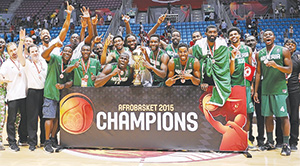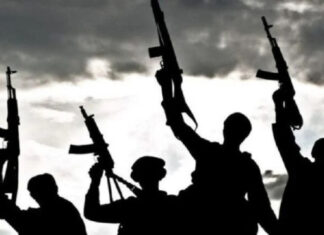Last Thursday, Nigerians as rolled out the drums and clicked the wine glasses to mark the nation’s 55 years of existence as an independent nation.
Nigeria like some colonial territories in Africa, gained her independence on October 1, 1960 without shedding of blood like others that fought bitter wars for independence.
Nigeria’s fifth elected President, Muhammadu Buhari, has taken office at the time our sports are neither here nor there in terms of successes.
Stakeholders agree that policy somersaults caused by frequent changes of sports ministers have been the greatest bane of Nigeria’s sports development.
In about 55 years of nationhood, Nigeria has had 32 ministers supervising the sports sector, the last being Tanmuno Danagogo, who bowed out last May 28, after spending just 14 months in office that were bedeviled with football crises.
The first minister in-charge of sports was Chief J.M. Johnson, who was Minister of Labour and had concurrent oversight on sports from 1960 to 1964 and played a pioneering role. He was succeeded by Hon. J.C. Obande, Minister of Establishment and Labour, 1965-1971, whose tenure ushered in the military regime.
Brigadier Henry Adefope, who later became a member of the International Olympic Committee (IOC) held sway between 1971 and 1976 as the Federal Commissioner for Labour. Adefope was succeeded by Major- General Olufemi Olutoye, the Federal Commissioner for Social Development, Youth and Sports from 1975-1977.
Dr. Dan Isokeari held sway between 1977 and 1979 as the Federal Commissioner for Social Development, Youth and Culture and was replaced by Mr. P.C. Amadike, who was in-charge till 1981.
Adebisi Ogedegbe was in office for one year, between 1982 and 1983, before Alhaji Buba Ahmed, former National Secretary of the then ruling National Party of Nigeria (NPN) was sworn-in in 1983, the last year of the brief civilian government.
The military returned to power and in quick successions, Group Captain Emeka Omeruah, Lt. Col. Adamu Abdullahi, Air Commodore Bayo Lawal, Tonye Graham-Douglas, Air Commodore Anthony Ikhazobor and Major Gen. Yohana Kure were appointed into the ministerial sports portfolio.
Vivacious Alex Akinyele, pragmatic Late Shola Rhodes and golden Jim Nwobodo, were also in office before Commodore Omeruah returned again and exited with the military in 1999.
Since the return of civilian government 16 years ago, 13 ministers have held the sports portfolio.
They include Damishi Sango, Late Mark Aku, Late Steven Akiga, Col. Musa Mohammed (rtd), Dr. Saidu Sambawa, Bala Ka’oje, Abdulrahman Gimba and Sani Ndanusa. Others are Ibrahim Isa Bio, Prof. Taoheed Adedoja, Yusuf Suleiman, Bolaji Abdullahi and Dr. Tanmuno Danagogo.
These political appointees came in first to learn the ropes, and before they mastered the sector, they were removed for different reasons. Such was the fate of Bolaji Abdullahi , who was appointed in December 2011, and after his first failed outing at the London 2012 Olympics with Team Nigeria, he began to re-engineer the sector for podium results. And even as the Goodluck Jonathan Presidency was enjoying the trophies, medals and accolades that were won by our teams and athletes, Abdullahi was shoved aside over political consideration.
Buhari’s Minister of Sports, must be somebody who is knowledgeable in the sector and has the vision to provide the required leadership for the National Sports Commission (NSC) under its new Director- General, Alhassan Yakmut, to implement a new roadmap for sports.
Yakmut, a former national athlete turned administrator, is full of progressive ideas and is unhappy over the decay of sports facilities, a sine qua non for the training and development of athletes.
The country is no longer a threat to any footballing playing country even though football is largely considered the Nigeria’s number one sport.
For instance, at the last FIFA Under-20 World Cup in New Zealand, the country lost two matches to Brazil 2-4 and Germany 1-0 but managed to beat Korea DPR 4-0 to crash out of the group stage.
The situation was not different at the FIFA Women’s World Cup in Canada where the Super Falcons drew 3-3 with Sweden but lost 2-0 to Australia and 1-0 to USA to also crash out of the group stage.
Both the Super Falcons and the Super Eagles failed to make it to the final of the football events at this year’s African Games in Congo Brazzaville, thus paving the way for other sports such as boxing, weightlifting, wrestling, and special sports to bring honour and glory to the country.
Nigeria’s national basketball team made the headlines internationally when it qualified for the 2012 Summer Olympics as it beat heavily favoured world elite teams such as Greece and Lithuania.
Nigeria has been home to numerous internationally recognised basketball players in the world’s top leagues in America, Europe and Asia. These players include Basketball Hall of Famer Hakeem Olajuwon, and later NBA draft picks Solomon Alabi, Yinka Dare, Obinna Ekezie, Festus Ezeli and Olumide Oyedeji.
The United States has a lot of impact in the Nigerian national team as the Nigerian basketball team is dominated by Nigerian Americans.
It took the most populous Black Country in the world 42 years before they could qualify for the World Basketball championships in 2006 which was hosted in Japan.
Nigeria’s D’Tigers first qualified for the African championships in Senegal, 1972. In the tourney, the current African champions finished 12th having lost all its games.
At the Olympics, Nigeria was represented at the 2012 Summer Olympic Games. The lads finished the group play with a 1–4 record, having defeated Tunisia, in what would be their first ever Olympic game the first ever Olympic victory.
However, since 1995, the team has been very promising as it has qualified for every African championship.
In 2015, all efforts of the team yielded maximum results as the team against all odds emerged the ‘King’ of African basketball. Nigeria won her first ever AfroBasket, beating Angola in the final 74–65. As a result, the team has automatically qualified for the 2016 Olympics.
At the last African Games held in Congo Brazzaville, Nigeria ‘managed’ to come a distance second with 47 gold, 55 silver and 42 bronze to gainer 144 medals behind eventual winners, Egypt which garnered 85 gold, 64 silver and 68 bronze totaling 217 medals.
Even then, it must be admitted that our sporting prowess has declined as a result of non-existent sporting facilities in schools, higher institutions and various local government areas in the country.
Nigerian athletes train under excruciating conditions, and therefore, must be motivated and supported by the Administration to win laurels that showcase the potentials of the country and enhance her international prestige.
One way of motivating the players is for the Buhari Presidency to continue to reward successful teams financially.















